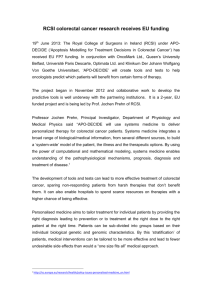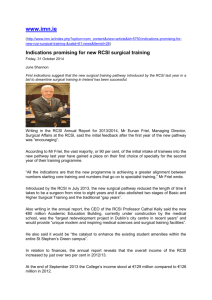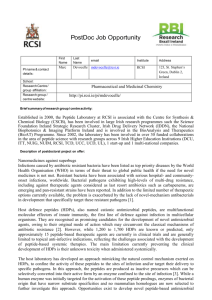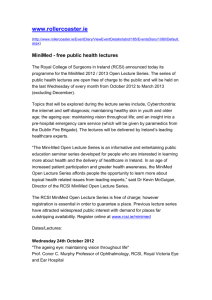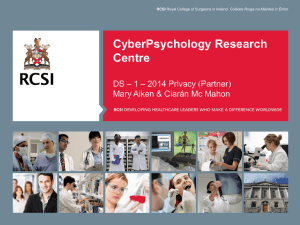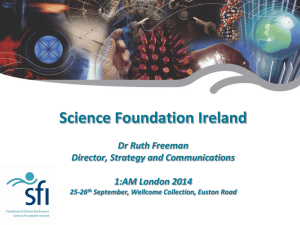Research Fellow or Senior Postdoctoral Fellow Colorectal Cancer
advertisement
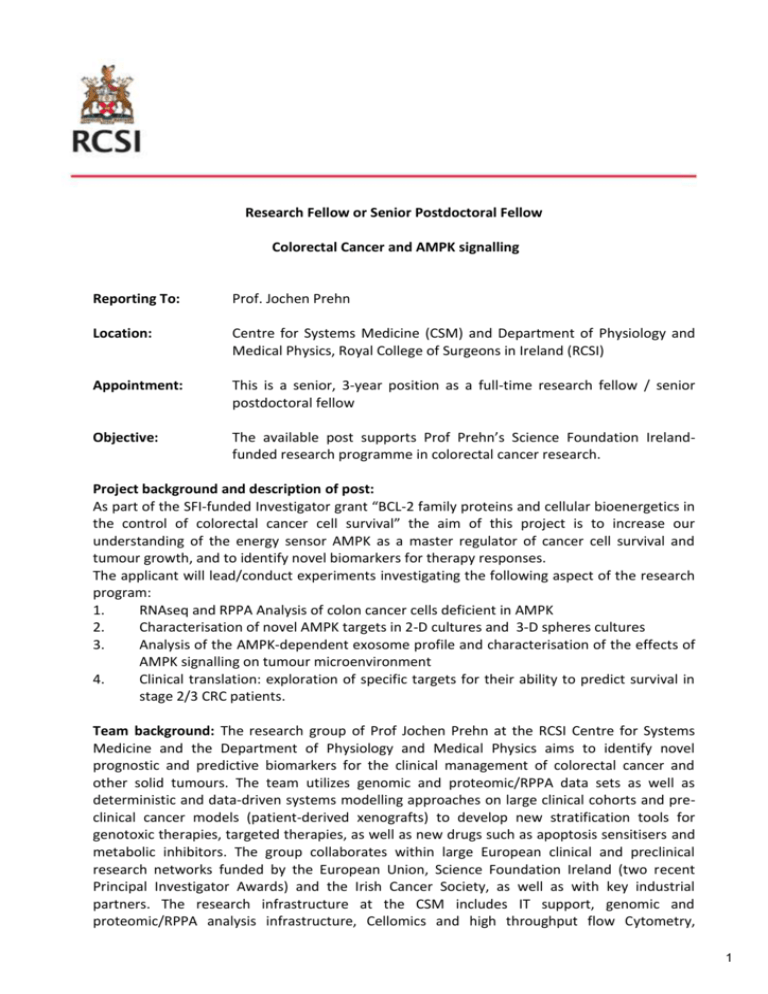
Research Fellow or Senior Postdoctoral Fellow Colorectal Cancer and AMPK signalling Reporting To: Prof. Jochen Prehn Location: Centre for Systems Medicine (CSM) and Department of Physiology and Medical Physics, Royal College of Surgeons in Ireland (RCSI) Appointment: This is a senior, 3-year position as a full-time research fellow / senior postdoctoral fellow Objective: The available post supports Prof Prehn’s Science Foundation Irelandfunded research programme in colorectal cancer research. Project background and description of post: As part of the SFI-funded Investigator grant “BCL-2 family proteins and cellular bioenergetics in the control of colorectal cancer cell survival” the aim of this project is to increase our understanding of the energy sensor AMPK as a master regulator of cancer cell survival and tumour growth, and to identify novel biomarkers for therapy responses. The applicant will lead/conduct experiments investigating the following aspect of the research program: 1. RNAseq and RPPA Analysis of colon cancer cells deficient in AMPK 2. Characterisation of novel AMPK targets in 2-D cultures and 3-D spheres cultures 3. Analysis of the AMPK-dependent exosome profile and characterisation of the effects of AMPK signalling on tumour microenvironment 4. Clinical translation: exploration of specific targets for their ability to predict survival in stage 2/3 CRC patients. Team background: The research group of Prof Jochen Prehn at the RCSI Centre for Systems Medicine and the Department of Physiology and Medical Physics aims to identify novel prognostic and predictive biomarkers for the clinical management of colorectal cancer and other solid tumours. The team utilizes genomic and proteomic/RPPA data sets as well as deterministic and data-driven systems modelling approaches on large clinical cohorts and preclinical cancer models (patient-derived xenografts) to develop new stratification tools for genotoxic therapies, targeted therapies, as well as new drugs such as apoptosis sensitisers and metabolic inhibitors. The group collaborates within large European clinical and preclinical research networks funded by the European Union, Science Foundation Ireland (two recent Principal Investigator Awards) and the Irish Cancer Society, as well as with key industrial partners. The research infrastructure at the CSM includes IT support, genomic and proteomic/RPPA analysis infrastructure, Cellomics and high throughput flow Cytometry, 1 confocal microscopy, microfluidics, multiphoton microscopy, ex vivo and 3-D sphere culture, and small animal bioluminescence facilities. RCSI: has 450 scientist and clinician researchers working in its research institute. The College has invested €59 million of its own non-exchequer funding in research infrastructures, human resources and research projects in the last 10 years. RCSI is among the top 50 most international universities in the world (Times Higher Education University World Rankings, 2014-15). It is a not-for-profit health sciences institution focused on education and research to drive positive change in all areas of human health worldwide. RCSI is headquartered in the city centre of Dublin, which is continuously ranked as one of the best cities to live in the world. Career Development Opportunities: The candidate will have a chance to be involved in PhD student supervision and supervision of technical and other research staff, manuscript preparation, proposal preparation, industry engagement and research management, significantly extending her/his career opportunities. In addition, RCSI has committed to a €50 million expansion of its research division over the next five years (including 20 Research Lecturers), providing new opportunities for entry into an academic career. Person Specification: The candidate should have a PhD in Genetics, Cell Biology, Biochemistry or a related field. (S)he should have significant knowledge in the subject areas described above and experience in cancer biology, molecular biology and cell signalling as documented by publications. Experience in AMPK signalling or bioinformatics is of advantage. For the appointment at the Research Fellow level, the candidate must have experience in supervising Master/PhD students, possessed a senior role in previous research projects, and participated in dissemination and commercialisation activities as per SFI guidelines for the appointment of Research Fellows (see Appendix). Applicants should demonstrate excellent organisational skills and the ambition, initiative, technical ability and willingness to work in collaborative fashion within and outside the research group. Salary: The successful candidate will be appointed on the salary scale at a point commensurate with qualifications and experience as per SFI guidelines. Application procedure: Please send a CV and accompanying documentation (references, up to 3 key publications) to prehn@rcsi.ie . Closing date: Applications are reviewed at an ongoing basis but should be received no later than June 15th, 2015. Other information: Further details can be obtained from Prof Jochen Prehn, Team Leader and Director of the RCSI Centre for Systems Medicine at prehn@rcsi.ie . 2 Web: http://www.systemsmedicineireland.ie/ Relevant publications from the group: 1. Lindner AU, Concannon CG, Boukes GJ, Cannon MD, Llambi F, Ryan D, Boland K, Kehoe J, McNamara DA, Murray F, Kay EW, Hector S, Green DR, Huber HJ, Prehn JH. Systems analysis of BCL2 protein family interactions establishes a model to predict responses to chemotherapy. Cancer Res. 2013 Jan 15;73(2):519-28. 2. Davila D, Connolly NM, Bonner H, Weisová P, Dussmann H, Concannon CG, Huber HJ, Prehn JH. Two-step activation of FOXO3 by AMPK generates a coherent feed-forward loop determining excitotoxic cell fate. Cell Death Differ. 2012 Oct;19(10):1677-88. 3. Kilbride SM, Farrelly AM, Bonner C, Ward MW, Nyhan KC, Concannon CG, Wollheim CB, Byrne MM, Prehn JH. AMP-activated protein kinase mediates apoptosis in response to bioenergetic stress through activation of the pro-apoptotic Bcl-2 homology domain-3-only protein BMF. J Biol Chem. 2010 Nov 12;285(46):36199-206. 4. Huber HJ, Dussmann H, Kilbride SM, Rehm M, Prehn JH. Glucose metabolism determines resistance of cancer cells to bioenergetic crisis after cytochrome-c release. Mol Syst Biol. 2011 Mar 1;7:470. 5. Concannon CG, Tuffy LP, Weisová P, Bonner HP, Dávila D, Bonner C, Devocelle MC, Strasser A, Ward MW, Prehn JH. AMP kinase-mediated activation of the BH3-only protein Bim couples energy depletion to stress-induced apoptosis. J Cell Biol. 2010 Apr 5;189(1):83-94. Appendix: SFI Guidelines for the Appointment of Research Fellows. For senior team members who, in the opinion of SFI, have unique and essential skills, SFI may fund a contribution to the salary of a Research Fellow according to the SFI Team Member Budget Scale Level 3 (SFI team member budget scales). Typically a Research Fellow would be expected to: -Doctoral experience he capacity for independent research laboratory -supervisory experience of Masters/PhD students who would act as their mentor (e.g. SIRG, PIYRA) standard cohort of post-doctoral researchers and have been given parity with tenured academic faculty. 3
